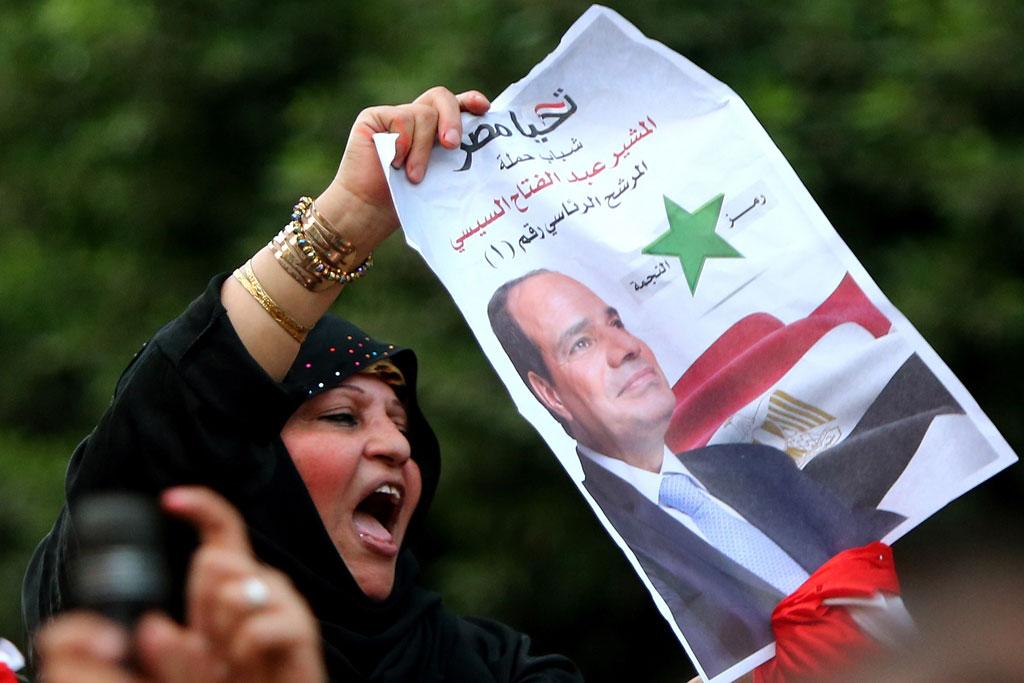After Egypt’s terribly low voter turnout, Sisi wins presidential election
A supporter of former army chief Abdel Fatah al-Sisi chants slogans in a street in Cairo on the second day of Egypt’s presidential election on May 27, 2014.
Abdel Fattah al-Sisi, the general who toppled Egypt's first freely elected leader, took more than 90 percent of the vote in a presidential election, provisional results showed on Thursday, joining a long line of leaders drawn from the military.
But a lower-than-expected turnout figure raised questions about the credibility of a man idolized by his supporters as a hero who can deliver political and economic stability.
Sisi won 93.3 percent of votes cast, judicial sources said, with most ballots counted after three days of voting. His only rival, leftist politician Hamdeen Sabahi, gained 3 percent while 3.7 percent of votes were declared void.
Turnout was about 46 percent of Egypt's 54 million voters, the government said, less than the 40 million votes, or 80 percent of the electorate, that Sisi had called for last week.
It was also less than the 52 percent turnout secured in the 2012 presidential election by Mohamed Mursi, the Islamist leader Sisi ousted last year after mass protests against his rule.
A Reuters tour of polling stations suggested turnout was low. Many Egyptians said voters had stayed at home due to political apathy, opposition to another military man becoming president, discontent at suppression of freedoms among liberal youth, and calls for a boycott by Islamists.
"These elections were just an act, a farce," said Mahmoud Ibrahim, 25, a resident of the sprawling Imbaba district who did not vote. "Turnout was low, but the media will lie to the people, all for the sake of the one man."
The stock market .EGX30, which fell 2.3 percent on Wednesday as some players said the turnout was a disappointment, was down two percent by midday on Thursday. On the black market, the Egyptian pound weakened slightly.
Tough measures
Sisi gained adulation from many Egyptians after deposing Mursi, whose one year in office was marred by allegations that he usurped power and mismanaged the economy.
But the lower-than-expected turnout suggest Sisi may not have the popular mandate to take the tough measures needed to restore healthy economic growth, ease poverty and unemployment, and end costly energy subsidies.
"The hard work starts here. The last 12 months have been about not being Mursi. Now the new regime has to deliver," said Simon Williams, chief economist at HSBC Middle East.
One of Sisi's biggest tests will be the politically-sensitive issue of energy subsidies which drain billions of dollars from the state budget every year. Businessmen have urged Sisi to raise energy prices even though that may trigger protests, or risk sinking the economy.
Tamer Abu Bakr, chairman of Mashreq Petroleum, predicted Sisi would put off any bold decisions in the first few months of his presidency, but a move was inevitable.
"(After) 30 or 40 years of subsidies, when you start to change things, prices go up … everything is going to get harder, we are stupid if we don’t think so," he said.
Since a series of television interviews he gave ahead of the vote, many Egyptians feel Sisi has not spelled out a clear vision of how he would tackle Egypt's challenges, instead making a general call for people to work hard and be patient.
He has presented vague plans to remedy the economy, suffering from corruption, high unemployment, and a widening budget deficit aggravated by fuel subsidies that could cost nearly $19 billion in the next fiscal year.
Army interests
Some Egyptians, exhausted after years of upheaval, have concluded that Sisi is a strong figure who can bring calm, even though past leaders from the military mismanaged the country.
Sisi also faces the formidable challenge of crushing an Islamist armed insurgency and eliminating any threat from the Brotherhood, which, as the country's best-organized political force, had won every national vote held after Mubarak's fall.
The Brotherhood, a movement loyal to Mursi and outlawed as a terrorist group, has rejected the election, describing it as an extension of the army takeover.
The Brotherhood, believed to have about one million members, has been devastated by one of the toughest crackdowns in its history. Its top leaders, including Mursi, are on trial and could face the death penalty. The movement seemed inspired by the low turnout in this week's poll.
"Sisi and those with him have to admit that Egypt is against them and the Dr. Mohamed Mursi is their president and the president of all Egyptians," an Islamist alliance that includes the Brotherhood said in a statement.
The United States, Egypt's ally in the West, has yet to comment on Sisi's victory.
(Additional reporting by Shadia Nasralla, Asma Alsharif, Yasmine Saleh. writing by Michael Georgy and Samia Nakhoul; Editing by Giles Elgood)
Every day, reporters and producers at The World are hard at work bringing you human-centered news from across the globe. But we can’t do it without you. We need your support to ensure we can continue this work for another year.
Make a gift today, and you’ll help us unlock a matching gift of $67,000!
